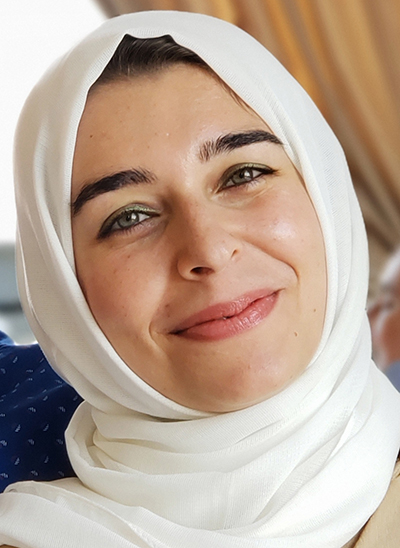 Congratulations to DSR grad Joud Alkorani, the recipient of the inaugural Sessional Teaching Award from the Department of Historical Studies at UTM. Joud holds an MA in Near and Middle Eastern Civilizations from U of T, and in August 2021 successfully defended her DSR PhD thesis, “Dubai Detours: Being Muslim after the Islamic Revival and Arab Spring.”
Congratulations to DSR grad Joud Alkorani, the recipient of the inaugural Sessional Teaching Award from the Department of Historical Studies at UTM. Joud holds an MA in Near and Middle Eastern Civilizations from U of T, and in August 2021 successfully defended her DSR PhD thesis, “Dubai Detours: Being Muslim after the Islamic Revival and Arab Spring.”
Professor Amira Mittermaier, Joud’s PhD supervisor, was delighted to learn of her achievement while also noting it did not come as a surprise: “Joud’s scholarship is original and exemplary, and equally remarkable are her generosity, collegiality, and team spirit. This award is yet another proof of her dedication – and it is all the more remarkable since it was won for a course taught remotely. I am excited for the students she is teaching now and the ones she will teach in the future.”
Joud is now an assistant professor in the Department of Islam Studies at Radboud University in the Netherlands. January 2022 will see her begin a 6-month postdoctoral fellowship at the Orient-Institut in Beirut, working on a project titled "God Helps Those who Help Themselves: Arab Muslims in Desperate Times."
In the 2020-21 academic year at UTM’s Department of Historical Studies, Joud taught Introduction to Diaspora and Transnational Studies I and II, which examine the history of diaspora, the relationship between nation states and their diasporic members, and the political and affective elements of diaspora and transnationalism. The experience of diaspora is considered through a series of historical and ethnographic case studies, with a major assignment being the student’s interview with a family member or friend who immigrated to Canada and a subsequent critical examination of that account in relation to diasporic narratives.
Joud’s nomination included comment on the excellence of her syllabi for these courses, noting that they were “thoughtful, clear, and provocative.” The nomination also recognized Joud’s “incredible commitment to students,” as shown by the significant logistical challenge she had in pulling together the threads of the main assignment.
Her primary motivation in teaching, Joud says, is “to demonstrate how all knowledge we receive or produce is shaped through power.” That factor underpins the narratives we draw on, she contends: “Acknowledging our own role and position in systems of power and knowledge production and transmission—both within and outside the university—is critical, and accounting for how we embody knowledge differently is the cornerstone of thriving in a community.”
The engagement of the student themselves was evident from numerous feedback remarks, ranging from early on in the course expressing excitement about the semester ahead to having become so interested in diaspora studies that “I am now interested in doing my master’s in immigration and settlement studies”, and finally describing Joud as “the most amazing prof I’ve had … I would take a class with her again simply because she is the professor.”
Joud notes that her own background as an immigrant—as a Syrian to North America then as a Syrian Canadian to the Arabian Gulf—has made her very aware of issues of representation and exclusion in the classroom. The unique combination of experience and knowledge that each student brings drives her desire, Joud says, to “make space for collective learning that leaves everyone—myself included—fundamentally changed by the encounter.”
(with files from Joud Alkorani)


